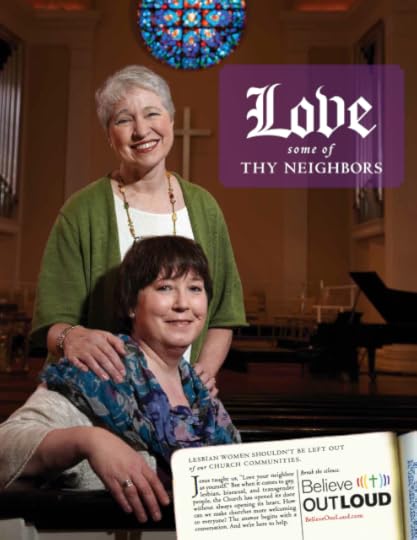Hemant Mehta's Blog, page 1928
September 13, 2014
Atheist Billboard Campaign in Brazil Aims to Change Stereotypes and Influence Elections
In 2011, the Associação Brasileira de Ateus e Agnósticos (Brazilian Association of Atheists and Agnostics) put up these incredible billboards around the country (forgive all my rough translations below):
“Religion does not define character” — Charlie Chaplin is described as someone who didn’t believe in god while Adolf Hitler is described as someone who did.
…
“Faith gives no answers. It only impedes questions.”
…
“We are all atheists with the gods of others” — the captions read “Hindu myth,” “Egyptian myth,” and “Palestinian myth.”
…
“If God exists, everything is permitted.”
…
All the ATEA logos contained the phrase “Say no to prejudice against atheists.”
In your face. Very blunt. It’s the kind of billboard you rarely (if ever) see in the U.S.
And now, ATEA is back with new billboards in anticipation of next month’s presidential election. The campaign focuses on two goals: Defending a secular government and ending prejudice against atheists.
“We are all atheists with the gods of others”
…
“Don’t vote with faith. Use reason”
…
“There are 2,000,000 atheist voters”
Opinion polls show that atheists are at the top of the scale of rejection in the country, arousing disgust or hatred in 17% of the population and dislike with another 25%. The bias has important election consequences since about 2 out of every 3 Brazilians never vote for an atheist, which effectively bars any political representation of atheism. That’s why we thought it was important to remind both society and ourselves of the strength of our numbers.
…
“Their religion. Not our law”
(The top image is from inside the Brazilian Supreme Federal Court, hence the slogan)
…
“Atheism: A personal relationship with reality”
…
“God does not help people. People help people”
…
ATEA notes on its website that the campaign will run in the capital cities of Porto Alegre, Florianópolis, greater São Paulo, Rio de Janeiro, Belo Horizonte, and São Luís.
You can see a lot of the billboards on location on the group’s Facebook page.
Watch Matt Dillahunty Explain the Argument from Design
In the next video for his Atheist Debates project, Matt Dillahunty explains the Argument from Design — specifically, how certain objects have the order, purpose, and appearance of design, but are actually the products of evolution:
I haven’t had a chance to watch the whole thing yet, but if any moments stand out, please leave the timestamp/summary in the comments!
September 12, 2014
Anti-Abortion Advocates Will Erect Memorials and Hold Services for Aborted Fetuses Tomorrow
If you haven’t already marked your calendar, you’re going to want to get right on it, because tomorrow is “National Day of Remembrance for Aborted Children,” at least according to anti-abortion advocates, who are setting up memorials, attending services, etc., all across America, to draw attention to the terrifying fact that women still have the right to choose in this country.
The movement approaches the question from an wholly rational viewpoint, making cogent and entirely new arguments for limiting a woman’s right to abortion.
… just kidding.
National Day of Remembrance for Aborted Children is all about trying to pack a punch to the feelz and hitting people in the emotions. The official site employs language like “broken bodies” and “society’s tiniest innocent victims” to describe aborted fetuses, and “graves of sorrow and graves of indictment on a nation that permitted the killing of the innocent” to describe the fetal burials they’ve facilitated. “We allow our hearts to be broken for them,” NDoRfAC’s press release declares (referring to aborted fetuses). Personhood is as absolutely presupposed as bodily autonomy is ignored. Apparently, people are supposed to bypass those trifling nothings and jump directly on the anti-abortion bandwagon at the sight of a grave marker. Because that’s the “reality of abortion.”
While the website doesn’t openly state that it is a Christian movement or reference any gods, its very banner gives a pretty good indication — what with the gravestone with a Bible verse, a reference to “Holy Innocents” & “preborn children of God,” and a funeral inside a church.
And a (very, very) little further digging reveals that, despite any half-hearted attempts at inclusivity, it’s most definitely the religious driving this peculiar day. (So, pro-life atheists? Looks like you’re still out in the cold.)
There are three sponsor groups for this anti-abortion day: Citizens for a Pro-Life Society, Priests for Life, and The Pro-Life Action League. Priests for Life speaks for itself, but the others are only a little less obviously religiously motivated. While the group’s director, Monica Miller, doesn’t reference God or religion in her statement on NDoRfAC’s page, on Citizens for a Pro-Life Society‘s website, she is more open. Phrases such as “God be praised!,” “God Bless You All!,” “God be praised and thanked,” “May the Christ Child, who lived under the heart of Mary, and was born in a stable, bless your Christmas with His Light,” “May the Blood of Christ triumph over all such places of death,” etc. is found in abundance.
The Pro-Life Action League is a little more reserved with its religiosity, but phrases like “Follow the Holy Father’s Lead and Join the National Day of Remembrance for Aborted Children” and calls to “prayer” campaigns against pro-choice advocates, etc. are found throughout.
So the motivation is clearly religious. And their efforts at inclusion are not long-lived. On the official website, organizers liken their work to that of early Christians countering “pagan” child “sacrifice” and encourage pro-lifers to carry on “the spiritual mission” of the day the rest of the year as well.
They also offer three pre-written prayers for the event. And, in case you’re wondering, they invoke: the “Father” and “Christ Our Lord”; the “Almighty Father” and “Our Lord Jesus”; and the “Lord,” “Christ,” and “Jesus the Lord.” All of which, in fairness, is really quite inclusive to religious people… as long as you pray to Jesus, and no other gods.
So, on second thought, you might as well cross National Day of Remembrance for Aborted Children off your calendar. Shucks.
It Was All Part of God’s Master Plan
Who really deserves the blame for the crucifixion…?
You can see the rest of the strip here 
(via Far Left Side)
Friendly Atheist Podcast Ep. 16: TAM2014: Dave Silverman & Comedians Paul Provenza, Kira Soltanovich, & Mike McShane
Our latest podcast guests are American Atheists’ Dave Silverman and comedians Paul Provenza, Kira Soltanovich, and Mike McShane.
(from L to R) Dave Silverman, Jessica Bluemke, Mike McShane, Kira Soltanovich, Paul Provenza
Dave Silverman is the President of American Atheists, a frequent guest on Fox News Channel, and the inspiration for a popular meme.
Paul Provenza is a stand-up comedian, director of The Aristocrats, and author of ¡Satiristas!.
Kira Soltanovich is a stand-up comedian who has appeared on the Oxygen Network’s “Girls Behaving Badly.”
Mike McShane is an actor and comedian who appeared on the British version of “Whose Line Is It Anyway?”
Jessica spoke with them about attending Catholic schools and what it means to be an atheist.
We’d love to hear your thoughts on the podcast. If you have any suggestions for people we should chat with, please leave them in the comments, too.
You can subscribe to the podcast on iTunes, get the MP3 directly, check it out on Stitcher, or just listen to the whole thing below.
And if you like what you’re hearing, please consider supporting this site on Patreon and leaving us a positive rating!
Three Christian Publications Reject Evangelical Group’s Ad Calling for a Conversation About Civil Marriage Equality
This week marked the launch of a welcome new group to the broader conversation about religion and marriage equality: Evangelicals for Marriage Equality:
As Evangelicals for Marriage Equality, we believe you can be a devout, Bible-believing evangelical and support the right of same-sex couples to be recognized by the government as married. Our commitment to following Christ leads us to speak out for equal treatment under the law for others — whether or not they share our religious convictions.
Good for them. They’re not saying evangelical churches should perform or recognize the marriages, only that the government should. You have to wonder why so many evangelical leaders have such a hard time getting behind that.
But organizers have already hit a problem. In order to publicize the group, they planned to purchase a full page ad (seen below) in three major Christian publications: Christianity Today, Relevant, and World Magazine.
All three rejected the ad:
Our first stop was Christianity Today, perhaps the country’s most prominent evangelical-focused print publication. CT rejected the ad, with the editor providing the following reason: “The reason is that the ad advocates a position that we have editorialized against.” So much for a “Chinese Wall” between the editorial staff and the advertising team.
Next stop: Relevant magazine, whose focus on pop culture gives them a younger readership and (we thought) an increased likelihood to run the ad. Instead, the word from the publisher was that the “ad was not approved based on political issues.”
Finally, we approached World Magazine about running our ad. Having only seen our organization name, World told us that they would “pass on the opportunity.”
It’s not the first time something like this has happened. In 2011, when the group Believe Out Loud, which “promotes LGBT-inclusion in the Christian church,” wanted to place ads in the heretic-level-liberal Christian publication Sojourners, Jim Wallis‘ organization rejected them because “Sojourners position is to avoid taking sides on this issue. In that [case], the decision to accept advertising may give the appearance of taking sides.”
And those were the “progressive” Christians…
Jonathan Merritt, writing at Religion News Service, thinks the publications made the right call this week in rejecting the newer ad:
Were these publications justified in rejecting this advertisement?
The simple answer is “yes.” And it has nothing to do with the truthfulness of the ad’s message or the lack thereof. Rather, these are independent evangelical publications who hold to a particular view of marriage. They have audiences with expectations about what is and isn’t consistent with a Christian worldview. And they should be free to only publish content that is consistent with both.
I don’t necessarily disagree with him. But I think the decision of the publications says a lot about where evangelical Christians are today: They’re so full of animosity against even the suggestion that gay people deserve equal rights in the eyes of the government, they can’t allow fellow evangelicals to say as much in their pages. No one’s asking them to change their views on homosexuality, or whether it’s sinful, or whether the church should support it. Evangelicals for Marriage Equality is asking Christians to do pretty much the least they can do.
So much for “love the sinner.”
Merritt also states:
I’m sorry, but a conservative publication should not be shamed for rejecting an ad that flies in the face of their convictions and beliefs. And, similarly, a liberal organization committed to marriage equality should be free to rescind a speaker’s invitation when they learn the speaker holds to a divergent position.
That’s a point I might agree with if the publications would be open about their political and social views.
Christianity Today claims that its distinctiveness is based, in part, on the idea that it has “a humble discontent with the status quo.”
Relevant says the same thing: “We try to publish ideas that break stereotypes, challenge the status quo and spur a generation to know God more…”
Their actions here show they don’t want to challenge the status quo at all. They are the status quo.
Merritt then tries to take a middle ground here that is just unacceptable:
Those on the left must stop labeling anyone who holds to a traditional Christian sexual ethic a “bigot” or “hater.” Those on the right must quit claiming that everyone on the left is a “heretic” or “doesn’t believe the Bible.” It is critical that Christians on both sides of the sexuality debate make their cases with winsomeness and grace.
But we’re not talking about a legitimate disagreement. We’re talking about civil rights and people who oppose them. To be clear, I don’t give a damn how the church sees homosexuality. If church leaders want to continue treating LGBT people like they’re deviating from “God’s Plan,” that’s their problem. They’ll continue to lose followers and I’ll be thrilled to watch their numbers drop. But for the government to do the same thing? That’s inexcusable. No decent person should be okay with the government treating same-sex couples any differently from straight ones, and that includes people of faith.
If you’re against loving, consenting adults getting married and having equal rights because you think your religious beliefs ought to trump their happiness, what else am I supposed to call you?
Evangelicals for Marriage Equality shouldn’t even have to exist because what they’re asking for should’ve happened a long time ago. The fact that Christian gatekeepers continue to keep them out of the conversation is a testament to why they need to keep fighting.
To respond to Merritt then, who wants to see a graceful conversation between “both sides of the sexuality debate” within Christianity, that’s not even a possibility when one side — the side with all the power — refuses to even acknowledge the other side through a purchased advertisement. Far from being an editorial admission that they were wrong, running the ads would only show that the evangelical tent isn’t quite so tiny.
Keep in mind that the ads we’re talking about aren’t even challenging what evangelicals have traditionally said about homosexuality. They’re literally saying let’s have a “new evangelical conversation about civil marriage equality,” not “You’re all wrong if you oppose marriage equality.”
It’s disappointing how quickly they were rejected, but it’s hardly surprising.
This Week, an Appeals Court Heard Arguments to Reinstate Tax-Free Housing for Pastors
For years now, the Freedom From Religion Foundation has been in a legal battle to end the “Parsonage Exemption” that allows ministers to deduct the cost of rent for their church-owned houses from their taxable income. FFRF believes that this shows preferential treatment by the government for religious leaders.
FFRF’s own board has even paid its co-presidents Dan Barker and Annie Laurie Gaylor $15,000 each as part of their housing allowance, but because they don’t qualify as “ministers of the gospel,” the law doesn’t apply to them. That’s one of the ways they’ve tried to prove the law is illegal.
Last November, U.S. District Judge Barbara B. Crabb ruled in favor of the FFRF, writing that the exemption was indeed unconstitutional.
Thanks to FFRF, he’s going to have to give some of that money back…
You can read much more about Crabb’s decision here.
That case was (to no one’s surprise) appealed by the U.S. Justice Department, and oral arguments took place this week in Chicago. Tom Cara, the President of the Freedom From Religion Foundation’s Metropolitan Chicago Chapter, was in the courtroom and offers his take on the situation below:
…
On Tuesday, the Seventh Circuit Court of Appeals, which encompasses Wisconsin, Illinois and Indiana, heard oral arguments that could overturn the FFRF’s claim that the Parsonage Exemption, in force since 1954, violates the Establishment Clause of the First Amendment.
In its brief, the FFRF stated that Section 107(2) of the Internal Revenue Service code “undeniably confers a significant tax benefit upon religious clergy that is not available to non-clergy taxpayers.” FFRF attorney Richard Bolton argued that benefits solely based on religion are unconstitutional.
I consulted with FFRF staff attorney Sam Grover, who was in attendance with many other FFRF attorneys, regarding this issue. He told me: “The real problem with 107(2) is that it elevates churches above similarly-situated secular organizations by granting a benefit only to religious leaders. This goes beyond the two ways the courts have said the government can permissibly benefit religious organizations: 1) it can create a neutral, generally applicable law that incidentally benefits religious organizations (like a tax break to all nonprofits, which would include religious nonprofits), or 2) it can alleviate a government-imposed burden on religion (like when the government moves soldiers abroad and then provides them with chaplains, since they aren’t near their own churches).”
Neither is the case here.
During the oral arguments, Justice Department attorney Judith Hagley submitted that FFRF could have claimed the ministerial exemption in its tax return but did not. She argued that if they had done this in the first place and were denied the credit, they could have then gone through the tax courts to claim that section 107(2) discriminates on the basis of religion. Bolton later pointed out the language in section 107(2) discriminates against FFRF on its face, since FFRF is not a church and Dan Barker and Annie Laurie Gaylor are certainly not “ministers of the gospel” (or ministers of any other religious doctrine). Actually claiming the exemption just to be denied would have been an exercise in frivolity.
The government next argued that an atheist church “minister” could be eligible for the tax exemption, as the IRS code defines this exemption as applying to any organization that follows a doctrine of belief, claiming even atheist organizations can be interpreted as a “church.” Of course, FFRF and other prominent atheist organizations have rationally and consistently maintained that atheism is not a religion. It is an absence of religion. And when pressed by the judges, attorney Hagley could not name a single “atheist megachurch,” though she maintained they do exist, a claim that’s been refuted before.
Hagley also argued taxpayers do not have the right to litigate the tax liabilities of others. Since this is a tax issue that does not apply to the plaintiffs, she argued they should not even have standing for this case. (That seems to be the crux of the issue, based on the judges’ remarks.)
But as stated by Sam Grover: “Basically, the counter-argument [to this] is that if a statute is under-inclusive and only people who benefit from the statute can challenge it, then the statute will never be challenged. It would be like granting a tax break only to white people and then claiming that a black person could not challenge the tax break as unconstitutional.”
It may be months before a decision is reached in this appeal. If the ruling is overturned, will FFRF take this to the Supreme Court? It’s hard to say in light of the current conservative majority controlling the Court and its recent decisions such as Town of Greece v. Galloway and Burwell v. Hobby Lobby Stores, Inc.
Let us hope (but skip praying) the Seventh Circuit Court upholds Judge Crabb’s decision and doesn’t just dismiss it on standing.
If you’re interested, you can listen to the oral arguments right here.
(Image via Shutterstock)
Even a Right Wing Attorney Says the Air Force Shouldn’t Reject an Atheist Who Disagrees with “So Help Me God” in Oath
***Update***: Wow, even Gordon Klingenschmitt agrees that an atheist should be able to omit the phrase from the oath.
…
It’s not often I get to say this, but OneNewsNow.com and the American Family Association is right.
I feel dirty…
Anyway, in response to the Air Force service member who was rejected for re-enlistment because he refused to sign an oath with the words “So Help Me God,” the AFA’s general counsel Patrick Vaughn writes:
Refusing to allow an Air Force sergeant who is an atheist to reenlist on the grounds that he will not take a “so help me God” oath violates Article 6 of the Constitution and the First Amendment. The loyalty oath is required by a single sentence in Article 6 that also allows a non-religious affirmation as an acceptable alternative and stipulates that no religious test shall ever be required (1). Long ago, the Court of Military Appeals clarified that “In cases of affirmation the phrase ‘So help you God’ will be omitted” (2).
…
The men who adopted the Constitution wisely evaluated that the tyranny of allowing government to judge whether a citizen was acceptably religious was a greater threat to the nation than allowing a person’s statement of loyalty to stand without an oath.
Nicely done, Vaughn…
I think we need a unique name for this sort of action, when a Christian you expect to say something crazy ends up making perfect sense.
I suggest the Pat Robertson Frequency. Because even he, on occasion, has the ability to surprise us with rationality.
(Thanks to Brian for the link)
Teacher Physically Lifts First-Grader Out of His Seat Because He Won’t Stand for the Pledge
If there are ever problems when a student doesn’t stand for the Pledge of Allegiance, it’s usually involves a teacher making a snide comment about it or threatening punishment.
But until now, I’ve never heard of a teacher physically lifting a student out of his seat because he wouldn’t stand up. That’s what happened to a first-grader in the New Town Public School District in North Dakota, according to the American Humanist Association’s Appignani Humanist Legal Center:
When the child has attempted to sit out the Pledge, however, he has been instructed by his teacher to stand — even physically lifted out of his chair – at the risk of disciplinary or retaliatory measures if he refused to stand. When [parents Jesse Moore and Kristina Leiffer] intervened to point out that their child cannot be forced to stand, their concerns were treated dismissively by both the teacher (a Mrs. Miller) and, subsequently, by [Principal Daniel] Anderson. In fact, to make matters worse, the child has now been instructed to stand outside the classroom — a public reprimand and humiliation that is totally unwarranted and unlawful — during the Pledge exercise.
Jesus…
According to the AHA, the parents contacted them because of their “Don’t Say the Pledge” campaign, a sign that the project is at least reinforcing the current law if not yet encouraging more students to remain seated.
I can’t wait to hear the school’s response to this one… in what world is it ever okay to touch a student like that? And for that reason?! It’s completely out of line.
(Image via Shutterstock)
Do Religious People Have Better Morals Than Non-Believers? Study Says Neither Side Has the Edge
Good without God? Join the club. Via Live Science:
Researchers asked 1,252 adults of different religious and political backgrounds in the United States and Canada to record the good and bad deeds they committed, witnessed, learned about or were the target of throughout the day.
The goal of the study was to assess how morality plays out in everyday life for different people, said Dan Wisneski [pictured below], a professor of psychology at Saint Peter’s University in Jersey City, New Jersey, who helped conduct the study during his tenure at the University of Illinois at Chicago.
The study’s findings may come as a shock to those who think religious or political affiliation helps dictate a person’s understanding of right and wrong. Wisneski and his fellow researchers found that religious and nonreligious people commit similar numbers of moral acts. The same was found to be true for people on both ends of the political spectrum.
And regardless of their political or religious leanings, participants were all found to be more likely to report committing, or being the target of, a moral act rather than an immoral act. They were also much more likely to report having heard about immoral acts rather than moral acts.
The self-reporting seems a little problematic, as people have a known tendency to present themselves as more moral than they are – and religiosity may play a factor in how readily they either lie or feel compelled to speak the truth. We’ll have to guess about the study’s other strengths and weaknesses; the full paper, published yesterday in the journal Science, is online, but — drat! — behind a paywall.
If the research withstands scrutiny, it puts the lie to the lazy if widespread assumption that there’s something uniquely moral about believers that is absent in atheists. You really don’t need gods to be an upstanding human being.
Surprised? Me neither.
Hemant Mehta's Blog
- Hemant Mehta's profile
- 38 followers

























